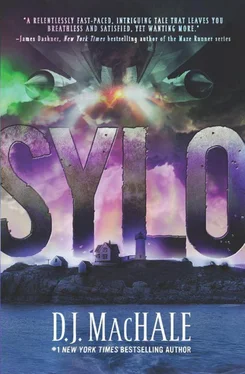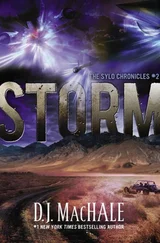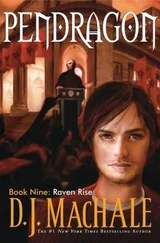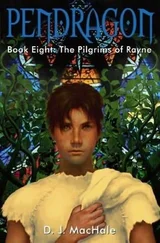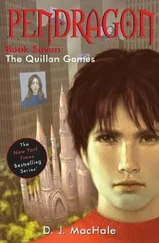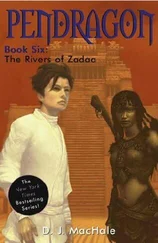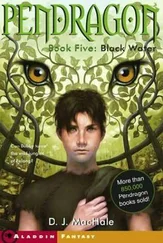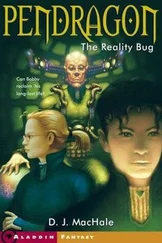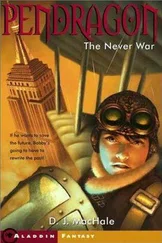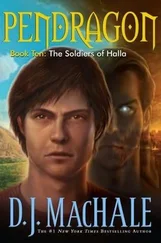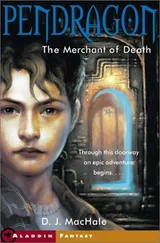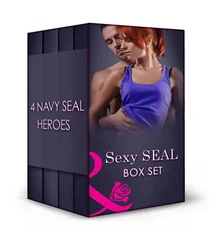Quinn grabbed his.
“I’ll call my parents,” he said, breathless. “Maybe there’s something online about this. Or on the news. Or something.”
Quinn punched in his number, listened, and…
“It’s not working.”
“Is your battery dead?” I asked while pulling out my own cell.
“No. There’s no signal.”
I had the same problem, as did everybody else around us who was trying to use their phones.
I heard the high whine of a motor scooter engine and looked to see Tori Sleeper tearing out of town, headed for the coastal road. Tori lived a few miles outside of Arbortown. She was probably headed home.
The troop transports had reached the scattered racing boats. I was afraid they would run them down but instead they pulled up close to each boat, allowing soldiers to leap from their transport onto the decks.
With rifles.
“I think we’re being invaded,” Quinn said with a gasp.
“No!” I shouted without thinking. “Why? By who?”
The soldiers took command of the racing boats and they all quickly changed course, headed for the harbor.
“It’s like they didn’t want the racers to escape,” Quinn declared.
“That’s insane!” I countered.
The transport vessels pulled up, forming a line in front of the marina. A small, fast gunship tore into the harbor and pulled up about twenty yards from the pier.
“Attention!” came an amplified man’s voice. The booming voice echoed through town as everyone fell silent. “Return to your homes. Immediately. I repeat. Return to your homes. Once the streets are cleared and secured, you will be given further instructions.”
Nobody moved. It was like we had all reached a new level of shock. Nothing that was happening made sense.
“What’s that?” Quinn asked, pointing skyward.
More parachutes had opened, but rather than soldiers dangling beneath the canopies, there was equipment. There were Jeeps and pallets loaded with boxes of…what? More weapons? Ammunition?
The booming voice continued, “Move off the streets in an orderly fashion and make your way to your homes or to the hotels where you are staying. The streets must be cleared immediately.”
The shock had worn off and people started pushing back. You don’t invade a town in New England where people have spent their entire lives without a fight. While those with small kids hurried off, most stayed and lined the seawall.
Quinn and I were right there with them.
There were angry shouts of “Who are you?” “Stay off our island!” “You aren’t welcome here!”
Nobody had any idea who these invaders were, but we knew for sure that we didn’t want any part of them, especially if they were giving orders. You don’t tell a Mainer what to do in his hometown. It was a bold stand, but not exactly practical. There were maybe two hundred brave and belligerent locals who took a stand on the seawall against what looked to be a massive military invasion.
“We will be landing shortly,” the voice continued. “Please clear the streets.”
The reaction was a chorus of boos and shouts as the people literally tried to wave them off. Quinn and I got caught up and shouted along with them, waving our arms and screaming at the invaders to go away. What else could we do?
“This is not an act of aggression,” the voice announced. “We need the streets to be cleared immediately to allow for our landing and everyone’s safety.”
“Let me through!” a guy shouted gruffly as he pushed his way forward through the crowd.
I turned to see Mr. Toll, a lobsterman who was older than dirt, making his way forward, clutching a shotgun.
“Uh-oh,” I said. “Bad idea.”
Mr. Toll was on a mission. He jumped up on the seawall and raised the shotgun.
“Whatever you got, we don’t want any!” he shouted, and before anybody could stop him, he unloaded both barrels.
The ships were too far away for the shots to do any damage. All it did was escalate the situation from confusing to dangerous.
“They’re firing back!” a lady yelled.
Sure enough, a soldier stood on the bow of the gunship and raised a large-bore rifle that looked a good deal more lethal than Mr. Toll’s twelve-gauge. Before anyone could move, the soldier fired.
Several people screamed in terror but nobody was hit.
What the soldier fired was tear gas. The shell exploded not ten feet from Quinn and me and spewed a cloud of smoke that forced people to scatter. Another shot was fired and a second tear gas canister exploded further along the seawall.
The caustic smoke was already in my eyes, making them burn like I had been rubbing them with hot peppers.
“We gotta get outta here,” I said to Quinn and grabbed his arm to pull him back from the water.
Most people had the same idea. No matter how badly they wanted to defend the town, they were no match for a well-armed military invasion. Kids everywhere were crying as people staggered away from the marina in fear and confusion. A handful of older guys stayed and continued to shout at the boats but it was a futile gesture.
Pemberwick Island was being invaded whether we liked it or not.
“Let’s go to my house,” I shouted to Quinn.
The two of us dodged through the crowd, which wasn’t easy because everyone was moving in a different direction. It didn’t help that festival booths lined the streets. It was bedlam that bordered on panic. People started getting nasty, shoving one another to get out of their way.
“Let’s get off of Main Street,” I said, and pulled Quinn toward a side street.
We didn’t get far because the paratroopers had arrived. They stood at each intersection, blocking the way to keep the people all flowing in one direction out of the downtown area. It was the first good look I got at our invaders.
They were definitely military but with uniforms like I’d never seen before. They wore camouflage fatigues in various shades of deep red rather than the familiar greens or grays. They also had on dark red berets and black bulletproof vests. Most daunting of all was the fact that they carried wide-bore rifles, held across their chests at the ready. The weapons looked to be the kind that fired beanbags rather than bullets. Or more tear gas. These guys definitely meant business, but at least it didn’t seem like they were ready to kill anybody. They each had a black baton hanging from their belts, along with handcuffs and a few other pouches that contained…I didn’t know what. They seemed to me more like hardcore riot-control policemen than combat troops…not that that explained anything.
“SYLO,” Quinn muttered.
“Huh?”
“The patch on their sleeves.”
Each soldier had a colorful round patch on his left shoulder. The background was green, with a simple yellow design that could have represented a rising sun. Stitched in bold black letters beneath the sun was one word: SYLO. The same rising-sun design was on the front of their berets. On their right shoulders was another patch: an American flag. That at least answered one question. These guys were U.S. military.
They stood at the street intersections, funneling the people in one direction: out of town.
The roar of multiple engines filled Main Street. Quinn and I ducked into the doorway of a store and looked back to see a few stragglers still near the shore. The paratroopers moved them gently yet insistently away from the pier. We soon saw why. They were clearing the way for the landing craft. The amphibious vehicles had finally arrived and motored up to the town launch until their wheels hit land. The engines whined as they continued up the cement ramp and onto Main Street. I counted ten in all. They roared out of the water and lined up next to one another. On someone’s signal the ramps dropped in front to reveal they were loaded with more SYLO soldiers, all armed with the same riot-control gear as the paratroopers. The soldiers jogged quickly and efficiently out of the landing craft and fanned out as if they had practiced this landing more than once.
Читать дальше
